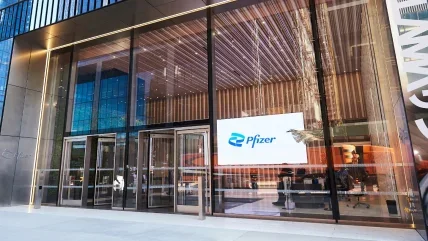
Arvinas and Pfizer have unveiled promising preliminary results from the Phase 1b portion of the TACTIVE-U sub-study, evaluating vepdegestrant in combination with abemaciclib for advanced breast cancer patients.
The ongoing TACTIVE-U sub-study is evaluating the combination in patients with locally advanced or metastatic estrogen receptor-positive (ER+)/human epidermal growth factor receptor 2-negative (HER2-) breast cancer.
Preliminary results from 16 patients in the Phase 1b sub-study showed a tolerable safety profile for the combination of abemaciclib 150 mg twice daily (BID) and vepdegestrant 200 mg once daily (QD).
An encouraging clinical benefit rate of 62.5% was observed in patients with both mutant ESR1 and wild-type ESR1 disease, all of whom had previously been treated with a CDK4/6 inhibitor.
Pharmacokinetic data showed no significant drug-drug interaction between vepdegestrant and abemaciclib, with no clinically meaningful effect on abemaciclib exposure.
The results also indicated a safety profile consistent with the known properties of abemaciclib and previous vepdegestrant trial data.
These findings support the ongoing Phase 2 study, evaluating full dose of both drugs in post-CDK4/6 advanced breast cancer.
Arvinas chief medical officer Noah Berkowitz said: “The preliminary results from this Phase 1b sub-study in patients whose cancer had previously progressed after receiving a CDK4/6 inhibitor are encouraging.
“These data further reinforce our belief that vepdegestrant can be used in multiple combination regimens across the metastatic breast cancer setting and has the potential to become a best-in-class backbone ER therapy.”
Vepdegestrant is an investigational, orally bioavailable PROTAC protein degrader. It is being developed as both a potential monotherapy and in combination therapy across multiple treatment settings for ER+/HER2- metastatic breast cancer.
In July 2021, Arvinas announced a global collaboration with Pfizer for the co-development and co-commercialisation of vepdegestrant. Both companies will share worldwide development costs, commercialisation expenses, and profits.
The US Food and Drug Administration (FDA) has granted vepdegestrant fast track designation as a monotherapy for adults with ER+/HER2- locally advanced or metastatic breast cancer who have been previously treated with endocrine-based therapy.
Arvinas and Pfizer are continuing to evaluate data from the ongoing TACTIVE-U trial, which includes combinations of vepdegestrant with abemaciclib, ribociclib, or samuraciclib.
Pfizer oncology chief development officer Roger Dansey said: “With vepdegestrant, we aim to develop a novel agent that has the potential to become a new backbone endocrine therapy in ER+ metastatic breast cancer.”






